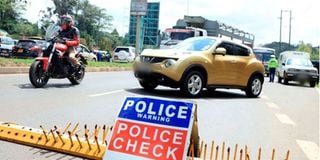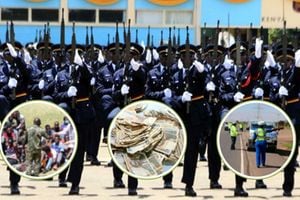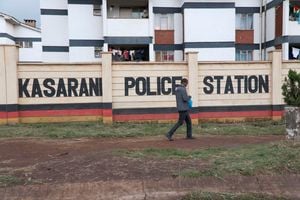
Traffic police officers mount a roadblock on Langata Road in Nairobi in mid-April 2021. The EACC has urged commuters who witness police officers taking bribes from public service vehicles to report them to the anti-graft agency.
The Ethics and Anti-Corruption Commission announced on July 14, 2022, that it had seized assets worth Sh27 million belonging to a former senior traffic police officer.
EACC said Chief Inspector, Gabriel Mulei, who served in various traffic offices including Kiambu and Malindi, was believed to have fraudulently accumulated cash and property.
In the radar of the anti-graft agency was Sh8,153,959 held in various bank accounts, six parcels of land, and four motor vehicles valued to a tune of Sh19,420,000.
The police boss is said to have acquired these properties and cash in three years between June 18, 2008, to February 11, 2011.
At the time, the chief inspector was earning a net salary of Sh20,000.
EACC seized these assets after the High Court on June 30, 2022, ruled that the officer had failed to explain how he acquired the properties.
Mr Mulei was also required to pay Sh10 million to the government as part of the unexplained assets he accumulated.
At the time the anti-graft agency said: "EACC is proceeding to execute this judgement. In addition, the defendant is to pay the sum of Sh10,536,199 to the Government of Kenya, the cumulative bank deposits made by him between June 18, 2008 and February 18, 2011.”
Court documents indicated that Mulei’s only declared assets during the period in question amounted to Sh2,382,240.
The court directed that all this unexplained wealth be forfeited to the government.
In 2016, Constable Susan Wangari Kamau, who was then based at the Kisumu traffic department, was at pains to explain Sh5 million in her three bank accounts. This was despite her salary of Sh 20,000.
Ms Wangari, who was being vetted by the Johnstone Kavuludi-led National Police Service Commission vetting panel, told the panelists that she owned several businesses including a clothes shop and rental buildings.
Wangari was hard-pressed to explain the source of Sh140,000 that she had received through her mobile phone. She explained that the cash belonged to an investment group that she ran together with her colleagues.
High-ranking officers
Now a report by a task force led by retired Chief Justice, David Maraga, has revealed how lucrative the Traffic Police Unit is to the extent bribes paid by motorists are shared high up the chain of command.
In a report presented to President William Ruto in November last year, Maraga told the president that bribes collected by junior officers were being passed to their seniors.
“The corruption allegations against the Traffic Police Unit are deeply rooted to the extent that high-ranking officers in the unit obtain a ‘cut’ from the bribes collected,” the report states.
The Maraga report revealed that the corruption in the Traffic Department cuts across the rank and file in the unit.
From the junior police officers, who mount roadblocks on the roads, to the senior police chiefs sitting in the corner offices, they (police) all benefit from the hundreds of thousands of bribes collected by the rogue traffic cops.
The report said senior police officers sanction the collection of bribes. As a result, the public had lost confidence in the police traffic department, hence the need for reforms.
Maraga pointed an accusing finger at top commanders in the police for failing to take action on officers who have been implicated in corruption.
Failure by police chiefs to prosecute corrupt officers has given credence to claims that some of the police bosses were involved in the corruption.
“It is also significant that despite the reported cases of corruption in this unit, not a single officer has been dismissed from the Service for engaging in bribery on the roads. This very fact points to leadership failure or possible complicity of the NPS leadership in this vice, “the report states.
Redeployed
Mr Maraga recommended that the Deputy Inspector General in charge of Kenya Police should disband the current traffic department and create a new traffic unit.
“All officers under the current Traffic Police Unit, and those who have previously served under the Unit should not be redeployed to the new Traffic Control Unit or any other traffic management duties or functions,” the report recommends.
The recommendation, the report states, is aimed at injecting fresh blood and confidence in the department that has for years been perceived to be the most corrupt unit of the police service.
DIG Eliud Lagat, whom the Maraga report places the responsibility of cleaning up the rot in the traffic department, told the Nation he has already started reconstituting the traffic department.
So far, four senior police bosses have already been moved from the traffic unit, and new officers who have previously not served in the traffic unit were appointed.
Last Wednesday, Mr Langat named Mr Fredrick Ochieng’ the new traffic commandant, as he transferred traffic bosses in Pangani, Kilimani, and Buruburu stations.
Ochieng’, who until his appointment served at the National Counter-terrorism Centre in Karen, will now take over from Ms Mary Wangui Omari.
Ms Omari is now the head of the Karen-based counter-terrorism center following the mini reshuffle.
Several mid-level traffic commanders in Nairobi have also been moved.
The affected officers have been transferred to SGR offices in Nairobi where they will now perform other police duties.
Mr Lagat told the Nation that the changes are aimed at strengthening operations in the traffic department in line with the ongoing police reforms.
As Lagat embarks on reforming the traffic department, he says, he will be guided by recommendations contained in the Maraga taskforce report on reforms in the police, prisons, and the National Youth Service.
This report, which has also been the subject of discussion at high offices including the State House, has outlined a raft of measures that the police chiefs must undertake as part of the reform process.
It warns that failure to reform the police department will lead to unending deaths on the roads and allow the free movement of drugs and weapons into the country.
If the traffic department is not reformed, the report adds, the transport sector will continue to witness deadly accidents because of non-adherence to the traffic rules.
To emphasise how deep the corruption in the traffic runs, the task force noted that an internal Anti-Corruption Strategy of 2016 had singled out the traffic department as the most corrupt unit of the police.
The task force has made several recommendations to clean up the traffic department.
The report recommends that DIG should direct that the traffic officers should be supervised by police station commanders (OCS).
This would mean that station commanders (OCS) will organise officers to be deployed to perform traffic duties.
The station commanders will then be responsible for supervising and coordinating traffic bases within their respective areas of operations.






